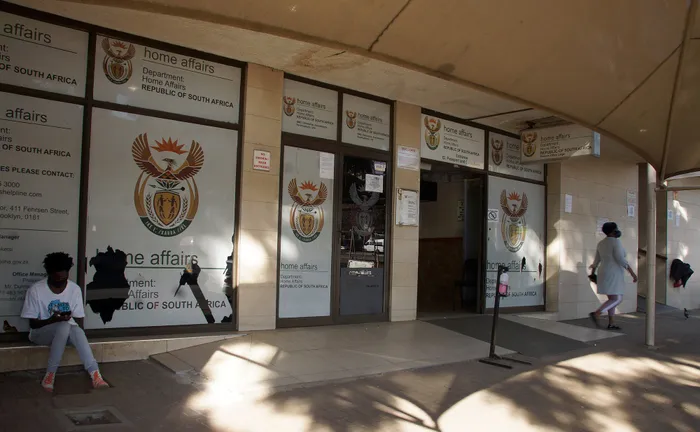Home Affairs beset with an array of challenges

The website of the Department of Home Affairs should stop giving the misleading impression (similar to other government departments) of a department under control, says the writer. Picture: Oupa Mokoena/African News Agency(ANA)
By Dr Tshepo Mvulane Moloi
The outcry from miscellaneous members of the South African public against the lacklustre services by officials of the Department of Home Affairs is amplifying.
The list of grievances includes disheartening queues, which commence beyond entrances of the majority of the branches of Home Affairs, key machinery being intermittently offline, fallible plenipotentiaries prone to bribery, and most recently, the growing calls for the resignation of Minister Aaron Motsoaledi.
In my view, Motsoaledi is among the few performing ministers in an obsolete ANC-led government. He is, sadly, let down in his present ministry by inept and corrupt plenipotentiaries. Removing him alone instead of the entire ANC Cabinet will be similar to playing the man instead of the ball.
In sum, such a move will not change anything. The aforesaid concerns, however, about the Department of Home Affairs, under his watch as the incumbent minister more than hints at a government department beset with obstinate challenges.
The latest mega bust by the Hawks of a fake passport syndicate, arrested on March 24, is among a string of sagas serving as evidence to support claims of corrupt activities apropos the Department of Home Affairs. Motsoaledi confirmed that 29 suspects, including an alleged kingpin, who was the mastermind behind the operation of selling fraudulent passports, were arrested in the Home Affairs office in Krugersdorp.
More arrests were imminent at other branches of the Department of Home Affairs. Details of the modus operandi of this syndicate confirmed the deep rot of maladministration, which disregarded all the immigration laws of South Africa.
Bribery of vulnerable South African victims and officials of the Department of Home Affairs was exposed. The aforesaid case reminded the public of almost similar exposures among others in the High-Level Panel Report on the State Security Agency (SSA), chaired by former minister of Safety and Security Sydney Mufamadi (released in December 2018) and the Report on State Capture, chaired by the then deputy chief justice Raymond Zondo (released in early 2022).
Effectiveness of the Department of Home Affairs continues to be raised amid the furore caused by infamous skirmishes led by “Operation Dudula” in Gauteng. The latter justify their operations in the guise of “Putting South Africans first”, a salvo directed against Africans they criticise as “undocumented foreign nationals”.
Such categorisation of fellow Africans must be rejected. As an Afrocentrist (explicated by Molefi Asante as one who subscribes to an ideology that Africans must be at the centre of their own experiences) which must not be confused with Pan-Africanists (members of a movement, not an ideology calling for African unity worldwide) I vehemently take exception with a historic derogatory references to any group of Africans, as this notably manifests self-inferiority.
Predictably, members of the public, unimpressed with Operation Dudula, have problematically slated them as xenophobic. For the record, xenophobia is a dislike of people from other countries, but it implies that those people are of multiple races.
Consistent with my Afrocentric stance, I opine that the latter charge is erroneous, in our local context. It must appropriately be replaced with Afrophobia, as the attacks are taking place only between indigenous Africans. In a recent interview, Motsoaledi found himself compelled to side with his political principal, President Cyril Ramaphosa, who went as far as labelling Operation Dudula as a “vigilante-like force”.
Such demeaning name-calling by the State President was unnecessary. Ironically, the “vigilantes” argue that they are helping government, especially the Department of Home Affairs and Police, by weeding out “undocumented foreign nationals”.
Motsoaledi inflexibly refutes any association between the Department of Home Affairs and Operation Dudula. Home Affairs has seemingly been in a quagmire for some time.
Unlike their counterparts, the Department of Police, led by the obdurate Minister Bheki Cele, Motsoaledi must not be in denial of the reality that his department must confront by sketching out plans to overcome identified problems.
For starters, the website of the Department of Home Affairs should stop giving the misleading impression (similar to other government departments) of a department under control. In the wake of ongoing exposés related Home Affairs, any claim(s) of being under control ought to be read as preposterous.
The listed concerns at the commencement of this article certainly challenge any denial of the Department of Home Affairs being in any purported position that may support wishful thinking of being under control.
Denialism will not solve anything. In reality, when one considers the malfeasance by an array of rogue individuals with proximity to politicians, in cahoots with government officials, then maladministration and corruption at Home Affairs (as elsewhere) should not astonish anyone.
Required solution(s) must begin from the premise that more than enough documents capturing rules and regulations of running government departments exist. What has always lacked is enough ethical plenipotentiaries with the political will to adhere to and implement rules.
* Moloi is a postdoctoral Research Fellow at the Ali Mazrui Centre for Higher Education Studies, University of Johannesburg